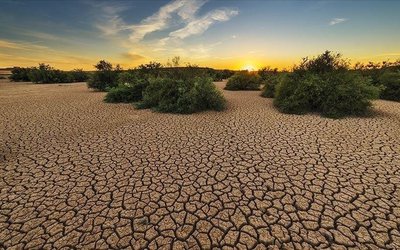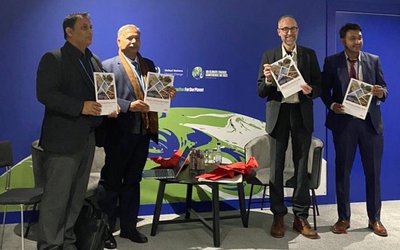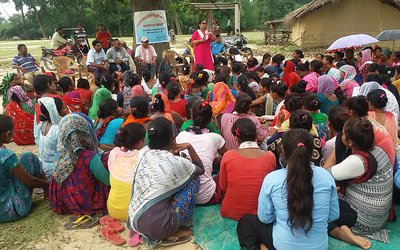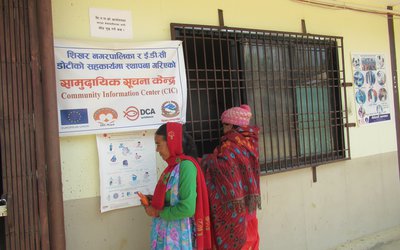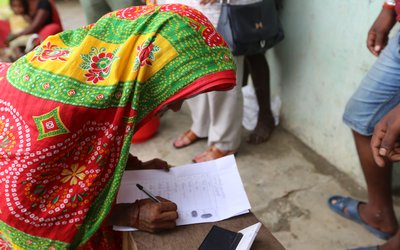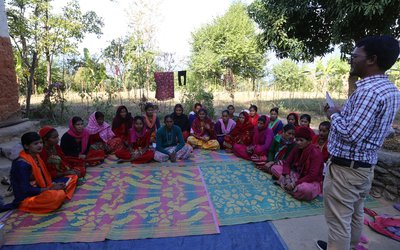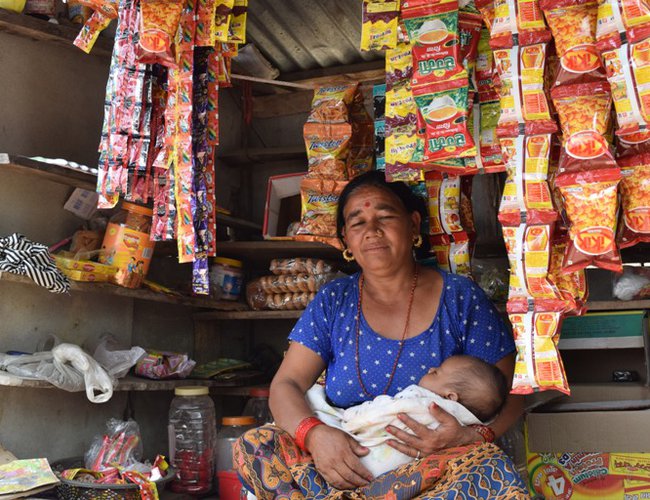
New High Shelter Help Eases Socio-Psycho Challenges
As soon as monsoon season starts, Sitaram Chaudhary, a resident of Jabalpur Village of Janaki Rural Municipality in Kailali district, feels panic and loses sleep. For many years his village has been frequently flooded by water at midnight. For Chaudhary, 44, monsoon also means displacement.
However, the situation will likely be different for them now. After the reconstruction of a new shelter, the flood victims of Jabalpur have been rehabilitated. Eleven families including Chaudhary, who were displaced by the floods last August, have been rehomed in newly reconstructed houses.
After the water damage to their households, these 11 families were residing in relatives’ homes. They returned home following the construction of their houses with support from Lutheran World Federation (LWF). According to Kali Ram Chaudhary, they were compelled to share their relatives’ houses because of economic conditions and their inability to reconstruct their own home. “Thanks to the support from LWF, our houses were reconstructed and we returned home,” said Chaudhary. “It is a great contribution for us.”
With a Rs 327,385 grant from the LWF and Rs 150,000 in individual contributions, Chaudhary reconstructed their new house. “As our new houses are three feet higher from the earth than the previous ones, we will be in a much safer position in coming floods,” says Chaudhary.
“Due to the frequent flooding of the houses, we suggested to reconstruct the houses four feet higher from ground,” says the Program officer of LWF Dhangadi Regional office, Man Dhoj Khatri. He also claims that LWF supported building high toilet and handpump sets.
Kada River displaces hundreds of people like Chaudhary annually, yet there’s no permanent shelter home.
With support from various organizations, a rehabilitation center has already been constructed in the ward no 7 of Jabalpur Village to provide safe lodging during the flood. The building was constructed on elevated ground to keep it above potential water levels. LWF, HURADC and Janaki Rural Municipality jointly supported the construction of the shelter to provide emergency aid to elderly, pregnant, and disabled people, as well as children. This has helped to ease psychological trauma.
Chaudhary explains that he feels much safer now with his new home’s higher, reconstructed base, as well as the addition of a temporary shelter.
With the reconstruction of a new house almost four feet higher from the ground, Chaudhary flood water will be prevented from entering his house again.
Chaudhary’s old house, with it’s lower basement, would be overwhelmed even by a normal level of water in the river. “I was closely saved in the last two floods when I was mid sleep as flooding inundated my house, damaging all the property, food and livestock.” Chaudhary describes even having to be rescued by his two brothers.
Kada river of Kailali district has been creating havoc by destroying millions of rupees worth of property and taking the lives of scores of people. The residents of Joshipur Rural Municipality, particularly ward no 3 , used to face all the consequences. It is normal to see the river’s water levels rising at midnight and flooding houses, the residents say.
However, last year’s flood, which was much bigger than previous ones “Floods destroyed our houses and swept away our livestock!” Cried one local. Even stored food grains were swept away.
For years, people could not sleep well during the monsoon due to the threat of Kada River. They needed to be cautious and watchful whenever rain came. With the reconstruction of better designed houses and the erection of temporary shelter nearby, Chaudhary and his neighbors have the chance for socio-psychological healing. With adequate infrastructure and forms of protection, they now see that monsoon won’t mean their lives will be worse. “This year’s monsoon flood brought a lot of things to our livelihood. We don’t have to worry much about the flood now. The support provided by the LWF has boosted our confidence level and helped to erase the tragic incidents of the past.”
Grocery Brings Changes in Livelihood
Krishna Maya Char, 48, lives in Rangpur village of Jhapa Rural Municipality Ward 3, on the bank of Sano Mai River. She lost everything in the last flood but has been able to revive her and her family’s lives in a matter of eight months through her grocery shop.
Although her husband earns money making bamboo buckets, his income is not enough to feed the family alone.
The flood washed out almost all their grain and clothes, and left Char without anything to eat.
In the first stage of the flood, Lutheran World Federation Nepal (LWF), with its local partner Social Network for Justice and Development (SNJD), arrived with essential supplies. They provided food, cloths and blakets to the flood victims.
“This support helped us to survive for months,” states Char. However, she was uncertain what to do to for her family’s future. “I was in a very difficult state after the water ceded, looking at the devastated land and damaged houses and toilets,” she says.
When SNJD came with a flood recovery program worth Rs.15000.00 (US$150), a Rangapur Community Based Organization recommended Char’s family as the poorest and most deserving of the grant. Due to this, she received the aid.
Owing to these funds, Char has been running a grocery store in the village. The grocery, which supplies essential commodities to her local community, has helped her support a family of seven. “This grocery is the bread maker for my family. I am making almost Rs.500 ($5) to Rs.600 ($6) a day. Frankly speaking, the profit margin is enough to run the family,” explains Char.
“I am considering adding more goods through my earnings, increasing my profit margin and income as well. This shop has taught me the skills to make money and do business.”
As Char, a dalit who migrated from the hills, has run the shop so successfully, other women in the areas have been lured by her success. “Other women from our community also want to be involved in small entrepreneurial business and are coming to learn from me.”
She describes how she has been depositing profit for future causes. “My aim is to save the amount of money I received from SNJD so that I can start my business in future if the same situation arrives.”
“Along with the skill of entrepreneurship, this small grocery empowers me within my own family.” I don’t have to depend on my husband and son for money anymore. This is really a big thing. I know the flood devastated my property and life but it also came as a boon to woman like me to learn the skill of running a business.”
Situated in between the two rivers of Sano Mai, Char’s house is in one of the most flood prone areas of Jhapa district. She might even face another flood next year if rainfall increases in the upper stream. Given her new business skill, she is confident that any days ahead will be better than the past.
For Char, her grocery is not about making her busy but helping her feed her six family members. “If the business runs normally, I can cope with any future flood financially,” Char exclaims with confidence.
The amount provided under the recovery program is bringing change to the livelihood of women, marginalized and vulnerable communities of Jhapa district.
- TANAHU HYDROPOWER PROEJCT: A Significant Achievement
- Apr 15, 2024
- AMBASSADOR HANAN GODAR: Sharing Pain With A Nepali Family
- Mar 30, 2024
- VISIT OF KfW AND EIB TO NEPAL : Mission Matters
- Mar 25, 2024
- NEPAL BRITAIN SOCIETY: Pratima Pande's Leadership
- Mar 24, 2024
- NEPAL ARMY DAY: Time To Recall Glory
- Mar 15, 2024

